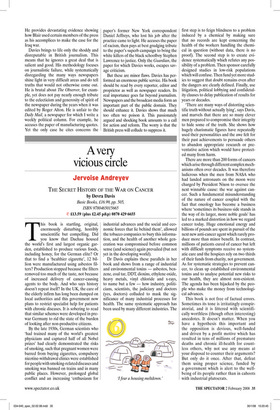A very vicious circle
Jervoise Andreyev
THE SECRET HISTORY OF THE WAR ON CANCER by Devra Davis Basic Books, £16.99, pp. 505, ISBN 9780465015665 ✆ £13.59 (plus £2.45 p&p) 0870 429 6655 This book is startling, original, enormously disturbing, horribly unscientific but compelling. Did you know that Dachau housed the world’s first and largest organic garden, established to produce various foods, including honey, for the German elite? Or that to find a ‘healthier cigarette’, 12 billion were manufactured using asbestos filters? Production stopped because the filters removed too much of the taste, not because of increased delivery of cancer-causing agents to the body. And who says history doesn’t repeat itself? In the UK, the care of the elderly infirm has long been dumped on local authorities and this government now plans to restrict specialist help for patients with chronic diseases. It is sobering to read that similar schemes were developed in prewar Germany to rid the state of the burden of looking after non-productive citizens.
By the late 1930s, German scientists who ‘had trained many of the world’s greatest physicians and captured half of all Nobel prizes’ had clearly demonstrated the risks of smoking, such that pregnant women were barred from buying cigarettes, compulsory nicotine-withdrawal clinics were established for people with smoking-related diseases and smoking was banned on trains and in many public places. However, prolonged global conflict and an increasing ‘enthusiasm for industrial advances and the social and economic forces that lie behind them’, allowed the tobacco companies to bury this information, and the health of another whole generation was compromised before common sense (and science) again prevailed (but not yet in the developing world).
Dr Davis explains these parallels in her book and shows from a range of industrial and environmental toxins — asbestos, benzene, coal tar, DDT, dioxins, ethylene oxide, heavy metals, vinyl chloride and x-rays, to name but a few — how industry, politicians, scientists, the judiciary and doctors (yes, doctors) colluded to mask the significance of many industrial processes for health. The same systematic approach has been used by many different industries. The first step is to feign blindness to a problem induced by a chemical by making sure that no records are kept concerning the health of the workers handling the chemical in question (without data, there is no proof). The second step is to create evidence systematically which refutes any possibility of a problem. Then sponsor carefully designed studies in low-risk populations which will confuse. Then fund yet more studies to suggest that doubt remains even after the dangers are clearly defined. Finally, use litigation, political lobbying and confidetality clauses to delay publication of results for years or decades.
‘There are many ways of distorting scientific truth without actually lying’, says Davis, and marvels that there are so many clever men prepared to compromise their integrity to hide some of the truth. She shows how hugely charismatic figures have repeatedly used their personalities and the awe felt for their past achievements to persuade others to abandon appropriate research or preventative action which would have protected many from harm.
There are more than 200 forms of cancers which arise through different complex mechanisms often over decades. It was therefore ludicrous when the men from NASA who had landed astronauts on the moon were charged by President Nixon to oversee the next winnable cause: the war against cancer. Such a fundamental misunderstanding of the nature of cancer coupled with the fact that oncology has become a business where ‘sometimes its business side stands in the way of its larger, more noble goals’ has led to a marked distortion in how we regard cancer today. Huge emotional energy and billions of pounds are spent in pursuit of the next new anti-cancer agent which rarely produce more than minor benefit. In contrast, millions of patients cured of cancer but left with difficult symptoms receive no systematic care and the hospices rely on two thirds of their funds from charity, not government. As for systematic strategies to prevent cancer, to clean up established environmental toxins and to analyse potential new risks to our health, they are almost non-existent. The agenda has been hijacked by the people who make the money from technological advances.
This book is not free of factual errors. Sometimes its tone is irritatingly conspiratorial, and it is littered with scientifically worthless (though often interesting) anecdotes. It doesn’t matter. When you have a hypothesis this important and the opposition is devious, well-funded and driven by a profit motive which has resulted in tens of millions of premature deaths and chronic ill-health for countless others, why not use any means at your disposal to counter their arguments? But only do it once. After that, defeat them using proper science, funded by a government which is alert to the wellbeing of its people rather than in cahoots with industrial plutocrats.


































































 Previous page
Previous page